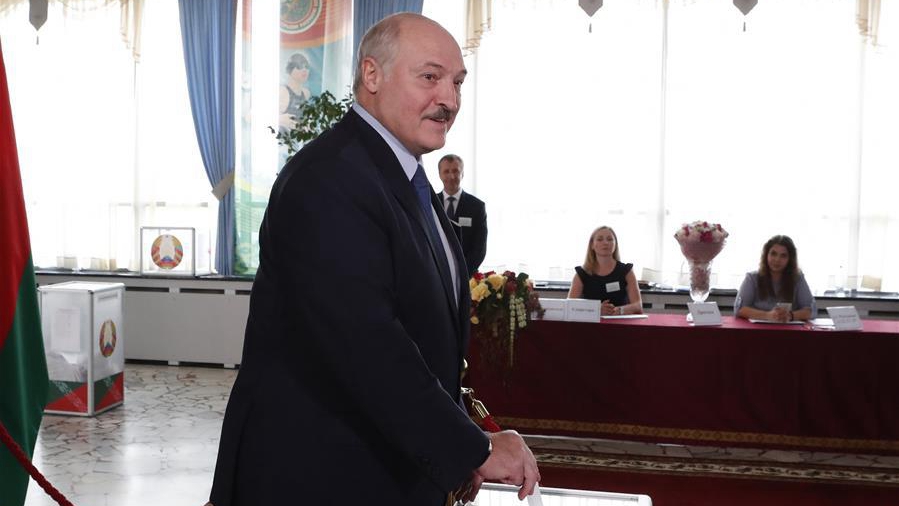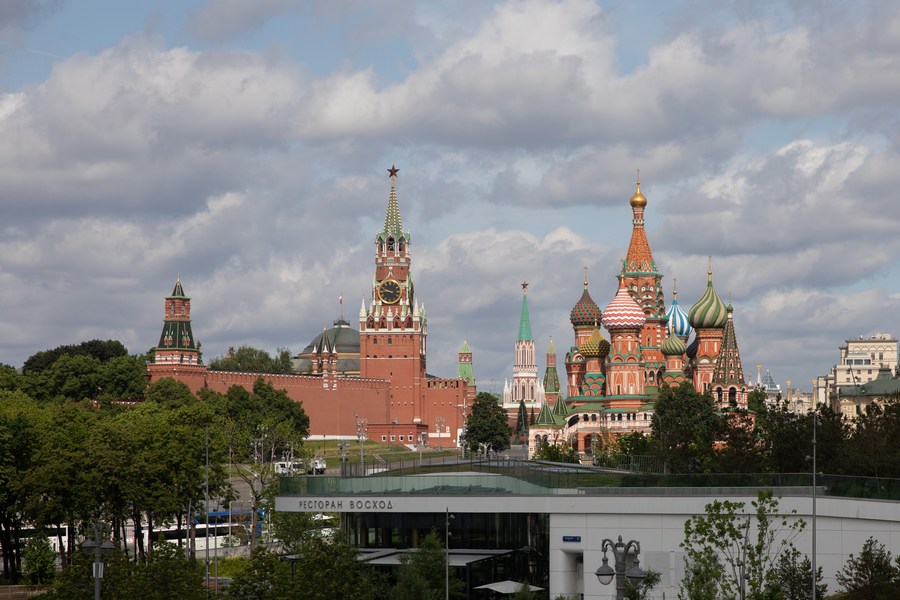
Belarusian President Alexander Lukashenko casts his ballot at a polling station in Minsk, Belarus, August 9, 2020. /Xinhua
Belarusian President Alexander Lukashenko casts his ballot at a polling station in Minsk, Belarus, August 9, 2020. /Xinhua
Editor's note: Nikola Mikovic is a freelance journalist based in Serbia. He covers mostly Russian, Ukrainian, and Belarusian foreign policies, and writes for multiple web magazines. The article reflects the author's opinions and not necessarily the views of CGTN.
Mass protests have destabilized Belarus. The opposition, as well as certain Western and Russian structures, demanded President Alexander Lukashenko to recount the votes, hold new elections, and negotiate with his political opponents. How will the situation in the Eastern European country unfold?
As soon as the polling stations were closed on August 9, and the Central Election Commission announced that Lukashenko has won the presidential election with 80.23 percent of the vote, the opposition staged mass protests that turned into violence.
Although Lukashenko's main rival, Svetlana Tikhanovskaya, got only 9.9 percent of the vote, the opposition claimed that the election was rigged. Even some pro-Kremlin politicians from Russia – which is Belarus' main ally – accused Belarusian authorities of falsifying the election results.
For instance, Konstantin Zatulin, first deputy chairman of the Russian State Duma Committee for the Commonwealth of Independent States Affairs, said that the election in Belarus was rigged. Thus, results are questionable.
Also, Sergey Mironov, who leads a faction in the Russian Parliament, backed the anti-Lukashenko protests, and the controversial Russian politician Vladimir Zhirinovsky, who is seen as the so-called system opposition, advised Lukashenko to withdraw his candidacy prior to presidential election. Finally, Russian media actively report protests in Belarus and often show a certain dose of sympathy for protesters.
On the other hand, Russian President Vladimir Putin has congratulated his Belarusian the election victory, saying that the future Russia-Belarus cooperation will deepen in the framework of the Union State, that integration processes within the Eurasian Economic Union and the Commonwealth of Independent States will intensify, and that military-political ties in the Collective Security Treaty Organization will strengthen.
Such a dichotomy within the Russian Federation is likely a reflection of the current Kremlin's position regarding Belarus. Some Russian political structures, primarily those connected to the energy sector, do not seem to be willing to preserve the status quo vis-à-vis its Western neighbor, while President Putin acts as a techno-manager who is balancing between the interests of various influential groups within the Kremlin.
There were speculations that one of the opposition candidates – Viktor Babariko, who spent 20 years working as the head of the Russian Gazprombank in Belarus – was backed by certain Russian structures connected with the energy giant Gazprom.
Even Svetlana Tikhanovskaya's husband Sergey, a popular Belarusian vlogger, said in one of his videos that ethnic Belarusians are part of the Russian world, which is why some analysts accused him of having close ties with Russia and its liberal-nationalist opposition led by Alexey Navalny.

The Kremlin Palace (L) and the Saint Basil's Cathedral in Moscow, capital of Russia, June 3, 2019. /Xinhua
The Kremlin Palace (L) and the Saint Basil's Cathedral in Moscow, capital of Russia, June 3, 2019. /Xinhua
Whether all these accusations are true or not, the fact is that Belarus is heavily linked with Russia. According to the official information, in 2019, Belarus owed 7.55 billion U.S. dollars to its eastern neighbor. Moscow has long been subsidizing the Belarusian economy and providing cheap crude oil and natural gas to the Eastern European country.
That way, the Kremlin has de facto been buying social peace in Belarus and Lukashenko's loyalty. Such a policy will likely change due to the coronavirus crisis that had a serious economic impact on both countries' economies.
Alexander Lukashenko is known as a politician who managed to successfully balance between Russia and the West. Now that the U.S. Secretary of State Mike Pompeo denounced the Belarus election as "not free and fair", and the former Vice President Joe Biden said that the vote was marred by electoral fraud, it does not seem very probable that Lukashenko's multi-vector foreign policy can continue.
Also, the European Union leaders refused to recognize the election results, although some EU member states, such as Latvia, tend to preserve relatively good relations with Minsk. It is worth mentioning that Latvia is interested in purchasing cheap energy that will be produced in Belarus' Astravets nuclear power plant that was funded by Russia.
In any case, after threats of sanctions and harsh rhetoric against Lukashenko, it is unlikely that Belarusian leader will make any U-turns and go westward. Western pressure seems to push Lukashenko deeper into Russia's geopolitical orbit.
Moscow, on the other hand, sees Belarus as a reliable partner in energy trade, and also as a transit state for Russian gas and oil supplies to Europe. That is why Russia is expected to keep requiring from Lukashenko to make significant concessions to the Kremlin, especially regarding energy prices, privatization of some of the Belarusian state-owned companies, and closer integration into various Russia-led organizations.
Since Belarus' relations with Russia will likely have to be redefined, Lukashenko's sixth term could be his most difficult one. If he refuses to make concessions to the Kremlin, he cannot count on cheap energy and subsidies, which are crucial for the Belarusian economy, and further destabilization of the country should not be excluded.
On the other hand, any closer integrations with Russia mean the end of the sovereign policy of Belarus, which was the pillar of Lukashenko's rule since 1994. Changes will undoubtedly come to Belarus, with or without Lukashenko in power.
(If you want to contribute and have specific expertise, please contact us at opinions@cgtn.com.)